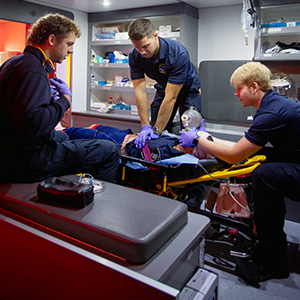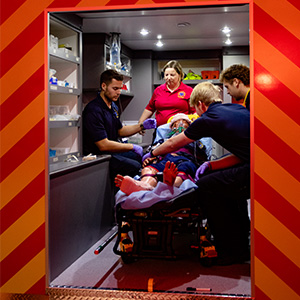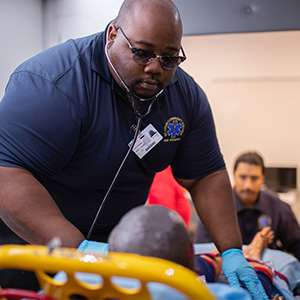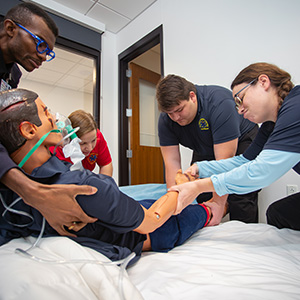Respond First to Those in Need as a Paramedic
Prepare for an in-demand career saving lives with a paramedic technology associate of applied science (AAS) degree or certificate of proficiency (CP) at St. Louis Community College. After graduating, you'll be capable of providing advanced life support, utilizing medical equipment and performing essential emergency surgical techniques under physician supervision.
This program has special admission requirements. Please review the requirements checklist before submitting your application.
What is Paramedic Technology at St. Louis Community College?
As a student, you'll work with licensed paramedics in traditional classroom settings as well as laboratories complete with an ambulance simulator. You'll progress to working on the frontlines, riding along with professionals in the field.
This program prepares students with paramedic skills such as:
- Assessing diagnostic signs and symptoms of major injuries and illnesses.
- Using ambulance, rescue vehicle and hospital emergency department equipment.
- Providing high-level emergency medical care and stabilizing emergency patients.
- Providing advanced life support to include fluid and drug therapy, as well as performing some essential emergency surgical techniques under the written or oral orders of licensed physicians.

What Can You Do with a Paramedic Technology Degree?
Graduates of either a degree or certificate will be eligible to obtain National Registry certification and to sit for state and national licensing boards.
These programs are not only a good fit for students who want to launch a career as a first responder, but they're also excellent options for those using emergency medical services as a stepping stone to other areas of health care.
Paramedic Technology Programs
- Degrees offered: AAS, CP
- Locations: Forest Park
- AAS hours to complete: 60
- CP hours to complete: 40
- Program Contact Name: Steve Newcomb
- Program Contact Email: snewcomb@stlcc.edu
- Accreditation:
The St. Louis Community College paramedic program is accredited by the Commission on Accreditation of Allied Health Education Programs (CAAHEP) upon the recommendation of the Committee on Accreditation of Educational Programs for the Emergency Medical Services Professions (CoAEMSP).
Contact CAAHEP:
25400 US Highway 19
Suite 158
Clearwater, FL 33763
727-210-2350Contact CoAEMSP:
8301 Lakeview Pkwy.
Suite 111-312
Rowlett, TX 75088
Phone: 214-703-8445
Fax: 214-703-8992
CoAEMSP website - These programs meet the educational requirements for state licensure in the following states: Missouri and Illinois. Students interested in pursuing licensure in a different state should contact the program coordinator for more information.
Tuition for district residents is $122 per credit hour for in-district students. Find out more about our straightforward and low-cost tuition structure.
Admissions Process
Prior to application, we recommend that you meet with an STLCC academic advisor. The advisor can help you plan your courses, clarify program requirements and review your academic history as it relates to this program.
- All applicants for the paramedic technology program must first be admitted to St. Louis Community College.
- Applications for this program are accepted on a continuing basis throughout the year. Visit an academic advisor to apply to the program.
- Applicants must attend a mandatory orientation session. The specific date, time and location of the orientation are included in the admissions letter.
- Following the orientation session, students begin the background check, drug screen and immunization process.
- Immunizations include MMR, TB/PPD (within last 12 months), Hepatitis A, Hepatitis B, varicella/chickenpox and current influenza.
Check out the paramedic technology program requirements.
Clinical Experience
Prior to attending clinical education, you will be required to:
- Submit proof of current American Heart Association Basic Life Support Provider CPR card.
- Submit a completed record of immunizations.
- Submit a negative tuberculosis (TB) skin test.
- Undergo a background check and drug screen through a College-approved background screening company prior to admission. Students not passing the criminal background check and/or drug screen may be prohibited from participating in clinical education. This will prevent the student from being able to complete all program requirements.
- Background checks and drug screens can be ordered at the CastleBranch portal.
- Meet technical standards related to observation, communication, motor skills, behavioral and social attributes.
Program Outcomes
Below, you will find data regarding the program outcomes for students in this program.
NREMT Psychomotor Exam
| Year | 2019 | 2020 | 2021 | 2022 | 2023 | 2024 |
|---|---|---|---|---|---|---|
| First-Time Pass Rate | 75% | 100% | 89% | 92% | 97% | NA |
| Pass Rate | 83% | 100% | 100% | 100% | 97% | NA |
NREMT Cognitive Exam
| Year | 2019 | 2020 | 2021 | 2022 | 2023 | 2024 |
|---|---|---|---|---|---|---|
| First-Time Pass Rate | 52% | 80% | 89% | 83% | 61% | 80% |
| Pass Rate | 85% | 90% | 96% | 91% | 84% | 88% |
Positive Placement (employed as a paramedic, continuing education or in the military)
| Year | 2019 | 2020 | 2021 | 2022 | 2023 | 2024 |
|---|---|---|---|---|---|---|
| % of those passing the exam | 71% | 90% | 89% | 71% | 93% | 100% |
Program Completion - The number of students that completed the program compared to the number enrolled in the program initially
Why You Should Choose STLCC's Paramedic Technology Program

Graduate with Little or No Debt
We believe cost should never be a barrier to achieving your potential. Save over $4,700 per year with tuition that's one-third lower than other local institutions.

Ramp Up High Wage Skills
STLCC offers career-focused programs for high-wage, high-skill and in-demand jobs.
STLCC provides opportunities for college transfers, career development and workforce
training.

Opportunities in the Field
The paramedic technology programs are excellent options for those using emergency medical services as a stepping stone to other areas of health care. With an aging population, students can expect high demand in the future for trained EMTs and paramedics.

Caring for Students
STLCC goes beyond academics with support services, ranging from stress and anxiety management to grants for childcare, emergency crisis support, clothing and free meals through Archers' Market and Brown Bag Cafe food pantry. We offer free tutoring on campus or online, plus access to Tutor.com.
STLCC. What's your reason?